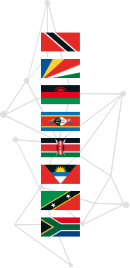MAKING AI GLOBALLY INCLUSIVE
Sir Hilary Beckles, Vice-Chancellor of The University of the West Indies, has seen the promise and pitfalls of AI firsthand as an educator – including one very personal example.
A student used generative AI to write an essay that cited a book Beckles had written years earlier. The AI-created essay lamented that if the author “had asserted her feminist identity” the book would’ve been far more useful for students.
You can see the problem here: Sir Hilary is not a woman. The large language model simply predicted wrong. For him, it highlighted the need to educate students on AI literacy and how they can boost their AI skills.
Thanks to a partnership between SAS and the Commonwealth Secretariat, students at his university and the others across the 56 member nations of the Commonwealth will have access to $10 million worth of software, computing capacity and training to help accomplish that goal – and more.
“Here we have a great moment in time, an opportunity where AI has the potential to create a global level playing field for everyone,” Beckles says.
Sir Hilary Beckles
Vice-Chancellor
The University of the West Indies
Patricia Scotland KC
Commonwealth Secretary-General
Suresh Yadav
Senior Director of AI, Trade, Oceans and Natural Resources
Commonwealth Secretariat
YOUTH IS SERVED
Sixty percent of the Commonwealth’s population – in countries spanning Africa, Asia, the Caribbean and Americas, Europe and the Pacific – is under the age of 29. But this project – an initiative of the Commonwealth Secretariat’s Commonwealth AI Consortium, which aims to build technological capacity with an emphasis on small states and young people – is not just about youth.
It’s also about righting historical inequities by taking advantage of the opportunity to train populations that have been left behind in major technological inflection points of the past, like the industrial revolution.
“If we are to deliver the future which we aspire to, it will take all of us,” says Commonwealth Secretary-General Patricia Scotland KC. “That means our countries, the industry, the professions, all the educators and the civil society groups. Together we are making an extraordinary difference.”
Students and educators in Commonwealth countries will have free access to SAS® Viya® for Learners, a comprehensive, cloud-native platform for data analytics, machine learning and AI, plus access to a variety of digital learning environments. It’s a public-private partnership that has the promise to deliver inclusive economic growth at a time when the pace of AI growth and adoption makes it all too easy for entire nations to fall behind.
It’s a public-private partnership that has the promise to deliver inclusive economic growth at a time when the pace of AI growth and adoption makes it all too easy for entire nations to fall behind.
“In our rapidly evolving digital landscape, we face not just a digital divide, but a critical infrastructure divide,” says Suresh Yadav, Senior Director of AI, Trade, Oceans and Natural Resources at the Commonwealth Secretariat. “If we fail to address this gap and make essential resources available to our youth, we risk losing an entire generation to technological inequality.”
BEYOND THE BUSINESS OF AI
In addition to boosting AI inclusivity, the partnership between SAS and the Commonwealth aims to ensure that participating students and educators will gain a deeper knowledge of the importance of responsible innovation.
“These students will not only gain AI skills coveted by employers around the world,” says Reggie Townsend, SAS Vice President of Data Ethics, “but they will also learn how to wield these powerful technologies ethically in ways that benefit society.”
The six principles of responsible innovation set out by SAS’ Data Ethics Practice – human-centricity, inclusivity, accountability, transparency, robustness, and privacy and security – are baked in to both the software and the training materials students and educators have access to.
That means whether the young people of the Commonwealth end up creating, using or simply living in a world with AI, they’ll be doing so in a way that avoids bias and unintended consequences.
And in time, Beckles imagines a Commonwealth so AI-literate that an AI mix-up like the one his student presented will be something he can laugh about instead of worry about – and where its nations are on par digitally with other leading countries around the globe.
“This is an intersection of AI and transformation,” Beckles says. “AI can be and must be the technology of reform, the technology of pursuing excellence with equity and with justice. It’s a convergence that’s very timely.”
RECOMMENDED FOR YOU
WELLNESS
PREPARING FOR THE NEXT PANDEMIC
Is avian flu in our future? If so, organizations are working to prepare the world using data and analytics for testing, treatment and more.
SOCIAL GOOD
PUTTING RESILIENCE ON THE MAP
A new analytics tool could make countries better prepared for future crisis.
Curious about SAS and the analytics that empower organizations everywhere?
